- Home
- Eoin Colfer
The Time Paradox
The Time Paradox Read online
HYPERION BOOKS
New York
Text copyright © 2008 by Eoin Colfer
All rights reserved. Published by Disney • Hyperion Books, an imprint of Disney Book Group.
No part of this book may be reproduced or transmitted in any form or by any means, electronic or mechanical, including photocopying, recording, or by any information storage and retrieval system, without written permission from the publisher. For information address
Disney • Hyperion Books, 114 Fifth Avenue, New York, New York 10011-5690.
New Disney • Hyperion paperback edition, 2009
1 3 5 7 9 10 8 6 4 2
Printed in the United States of America
This book is set in 13.5-point Perpetua.
ISBN 978-1-4231-0837-5
Library of Congress Cataloging-in-Publication Data on file.
Visit www.artemisfowl.com
Table of Contents
Other Books By Eoin Colfer
Prologue
Chapter 1 Espresso And Treacle
Chapter 2 The World's Biggest
Chapter 3 Echoes Of Magic
Chapter 4 Monkey's Uncle
Chapter 5 I Now Pronounce You
Chapter 6 I To I
Chapter 7 Talk To The Animals
Chapter 8 A Blob Of Phlegm
Chapter 9 The Frog Prince
Chapter 10 A Fowl Mood
Chapter 11 Pigeon Droppings
Chapter 12 Gone Forever
Chapter 13 The Hairy One Is Dead
Chapter 14 The Hole In The Ace
Chapter 15 Murder Most Fowl
Chapter 16 A Team Of Hairdressers
Epilogue
Preview Of Airman
Artemis Fowl: Read The Entire Series
Artemis Fowl Book 1
Artemis Fowl Book 2: The Arctic Incident
Artemis Fowl Book 3: Eternity Code
Artemis Fowl Book 4: Opal Deception
Artemis Fowl Book 5: Lost Colony
Artemis Fowl Book 6: Time Paradox
Artemis Fowl Book 7: Atlantis Complex
OTHER BOOKS BY EOIN COLFER
Artemis Fowl
Artemis Fowl: The Arctic Incident
Artemis Fowl: The Eternity Code
Artemis Fowl: The Opal Deception
Artemis Fowl: The Lost Colony
Artemis Fowl: The Graphic Novel
Artemis Fowl: The Arctic Incident, The Graphic Novel
Airman
Half Moon Investigations
The Supernaturalist
The Wish List
Benny and Omar
Benny and Babe
Eoin Colfer’s Legend of Spud Murphy
Eoin Colfer’s Legend of Captain Crow’s Teeth
Eoin Colfer’s Legend of The Worst Boy in the World
For Grace: a new daughter,
granddaughter, niece, and cousin
PROLOGUE
Fowl Manor
Barely an hour north of Dublin’s fair city lies the Fowl estate, where the boundaries have changed little in the past five hundred years.
The manor house is not visible from the main road, shrouded by a fan of oak trees and a parallelogram of high stone walls. The gates are reinforced steel with cameras perched upon their pillars. Were you allowed to pass through these discreetly electrified portals, you would find yourself on a pea-gravel avenue, meandering gently through what was once a manicured lawn, but has now been encouraged to evolve to a wild garden.
The trees grow dense as you approach the manor itself, soaring oak and horse chestnut intermingled with more delicate ash and willow. The only signs of cultivation are a driveway free of weeds and the glowing lamps that float overhead, seemingly without tether or cable.
Fowl Manor has been the site of many grand adventures over the centuries. In recent years the adventures have had more of a magical bent, though most of the Fowl family have been kept in the dark about this fact. They have no idea that the main lobby was completely destroyed when the fairy folk sent a troll to do battle with Artemis, the family’s eldest son and a criminal mastermind. He was twelve years old at the time. Today, however, Fowl activity in the manor is entirely legal. There are no fairy special forces storming the battlements. No elfin police officers held captive in the cellar. Nor any signs of a centaur fine-tuning his listening devices or running thermal scans. Artemis has made peace with the Fairy People, and formed solid friendships among their ranks.
Though his criminal activities earned Artemis much, they cost him more. People he loved were distraught, injured, and even abducted because of his schemes. For the past three years his parents thought him dead while he fought demons in Limbo. And on his return, he was flabbergasted to find that the world had moved on without him, and he was now the older brother to two-year-old twin boys, Beckett and Myles.
CHAPTER 1
ESPRESSO AND TREACLE
Artemis sat on an oxblood leather armchair, facing Beckett and Myles. His mother was in bed with a slight case of the flu, his father was with the doctor in her room, and so Artemis was lending a hand in entertaining the toddlers. And what better entertainment for youngsters than some lessons?
He had decided to dress casually in a sky blue silk shirt, light gray woolen pants, and Gucci loafers. His black hair was swept back from his forehead, and he was putting on a jolly expression, which he had heard appealed to children.
“Artemis need toilet?” wondered Beckett, who was squatting on the Tunisian rug, wearing only a grass-stained sweater, which he had pulled down over his knees.
“No, Beckett,” said Artemis brightly. “I am trying to look jolly. And shouldn’t you be wearing a diaper?”
“Diaper,” snorted Myles, who had potty trained himself at the age of fourteen months, building a stepladder of encyclopedias to reach the toilet seat.
“No diaper,” pouted Beckett, slapping at a still-buzzing fly trapped in his sticky blond curls. “Beckett hates diaper.”
Artemis doubted that the nanny had neglected to put a diaper on Beckett, and he wondered briefly where that diaper was now.
“Very well, Beckett,” continued Artemis. “Let’s shelve the diaper issue for now, and move on to today’s lesson.”
“Chocolate on shelves,” said Beckett, stretching his fingers high to reach imaginary chocolate.
“Yes, good. There is sometimes chocolate on the shelves.”
“And espresso,” added Beckett, who had a strange set of favorite tastes, which included espresso sachets and treacle—in the same cup, if he could manage it. Once Beckett had managed to down several spoons of this concoction before it was wrested away from him. The toddler hadn’t slept for twenty-eight hours.
“Can we learn the new words, Artemis?” asked Myles, who wanted to get back to a mold jar in his bedroom. “I am doing ’speriments with Professor Primate.”
Professor Primate was a stuffed monkey, and Myles’s occasional lab partner. The cuddly toy spent most of its time stuffed into a borosilicate glass beaker on the ’speriment table. Artemis had reprogrammed the monkey’s voice box to respond to Myles’s voice with twelve phrases, including It’s alive! It’s alive! and History will remember this day, Professor Myles.
“You can go back to your laboratory soon,” said Artemis approvingly. Myles was cut from the same cloth as himself, a natural-born scientist. “Now, boys, I thought today we might tackle some restaurant terms.”
“Sneezes look like worms,” said Beckett, who wasn’t one for staying on topic.
Artemis was nearly thrown by this remark. Worms were most definitely not on the menu, though snails might well be. “Forget about worms.”
“Forget worms?” said Beckett, horrified.
“Just for the moment,” said
Artemis reassuringly. “As soon as we have finished our word game, you may think on whatever pleases you. And if you are really good, then I might take you to see the horses.”
Riding was the onlyform of exercise thatArtemis had taken to. This was mainly because the horse did most of the work.
Beckett pointed to himself. “Beckett,” he said proudly, worms already a distant memory.
Myles sighed. “Simple-toon.”
Artemis was beginning to regret scheduling this lesson, but having begun he was determined to forge ahead.
“Myles, don’t call your brother a simpleton.”
“S’okay, Artemis. He likes it. You’re a simple-toon, aren’t you, Beckett?”
“Beckett simple-toon,” agreed the small boy happily.
Artemis rubbed his hands together. “Right, brothers. Onward. Imagine yourself seated at a café table in Montmartre.”
“In Paris,” said Myles, smugly straightening the cravat that he had borrowed from his father.
“Yes, Paris. And try as you will, you cannot attract the waiter’s attention. What do you do?”
The infants stared at him blankly, and Artemis began to wonder if he wasn’t pitching his lesson a little high. He was relieved, if a little surprised, to see a spark of comprehension in Beckett’s eyes.
“Umm . . . tell Butler to jump-jump-jump on his head?”
Myles was impressed. “I agree with simple-toon.”
“No!”Artemis said.“You simply raise one finger and say clearly ‘Ici, garçon.’”
“Itchy what?”
“What? No, Beckett, not itchy.” Artemis sighed. This was impossible. Impossible. And he hadn’t even introduced the flash cards yet or his new modified laser pointer, which could either highlight a word or burn through several steel plates, depending on the setting.
“Let’s try it together. Raise one finger and say ‘Ici, garçon.’ All together now .. .”
The little boys did as they were told, eager to please their deranged brother.
“Ici, garçon,” they chorused, pudgy fingers raised. And then from the corner of his mouth, Myles whispered to his twin, “Artemis simple-toon.”
Artemis raised his hands. “I surrender. You win, no more lessons. Why don’t we paint some pictures?”
“Excellent,” said Myles. “I shall paint my jar of mold.”
Beckett was suspicious. “I won’t learn anything?”
“No,” said Artemis, fondly ruffling his brother’s hair and immediately regretting it. “You won’t learn a thing.”
“Good. Beckett happy now. See?” The boy pointed to himself once more, specifically to the broad smile on his face.
The three brothers were stretched on the floor, up to their elbows in poster paint, when their father entered the room. He looked tired from his nursing duties, but otherwise fit and strong, moving like a lifelong athlete in spite of his bio-hybrid artificial leg. The leg used lengthened bone, titanium prosthetics, and implantable sensors to allow Artemis Senior’s brain signals to move it. Occasionally, at the end of the day, he would use a microwavable gel pouch to ease his stiffness, but otherwise he behaved as if the new leg were his own.
Artemis climbed to his knees, smudged and dripping.
“I abandoned French vocabulary and have joined the twins in play.” He grinned and wiped his hands. “It’s quite liberating, actually. We are finger painting instead. I did try to sneak in a little lecture on cubism, but received a splattering for my troubles.”
Artemis noticed then that his father was more than simply tired. He was anxious.
He stepped away from the twins and walked with Artemis Senior to the floor-to-ceiling bookcase.
“What is the matter? Is Mother’s influenza worsening?”
Artemis’s father rested one hand on the rolling ladder and lifted his weight from the artificial limb. His expression was strange, and one that Artemis could not recall ever seeing.
He realized his father was more than anxious. Artemis Fowl Senior was afraid.
“Father?”
Artemis Senior gripped the ladder’s rung with such force that the wood creaked. He opened his mouth to speak, but then seemed to change his mind.
Now Artemis himself grew worried. “Father, you must tell me.”
“Of course,” said his father with a start, as if just remembering where he was. “I must tell you. . . .”
A tear fell from his eye, dropping onto his shirt, deepening the blue.
“I remember when I first saw your mother,” he said. “I was in London, at a private party in The Ivy. A room full of scoundrels, and I was the biggest one in the bunch. She changed me, Arty. Broke my heart then put it together again. Angeline saved my life. Now . . .”
Artemis felt weak with nerves. His blood pounded in his ears like the Atlantic surf.
“Is Mother dying, Father? Is this what you are trying to tell me?”
The idea seemed ludicrous. Impossible.
His father blinked as if waking from a dream.
“Not if the Fowl men have something to say about it, eh, son? It’s time for you to earn that reputation of yours.” Artemis Senior’s eyes were bright with desperation. “Whatever we have to do, son. Whatever it takes.”
Artemis felt panic welling up inside him.
Whatever we have to do?
Be calm, he told himself. You have the power to fix this.
Artemis did not yet have all the facts, but nonetheless he was reasonably confident that whatever was wrong with his mother could be healed with a burst of fairy magic. And he was the only human on Earth with that magic running through his system.
“Father,” he said gently. “Has the doctor left?”
For a moment the question seemed to puzzle Artemis Senior; then he remembered. “Left? No. He is in the lobby. I thought you might talk to him. Just in case there’s a question I may have missed. . . .”
Artemis was only mildly surprised to find Dr. Hans Schalke, Europe’s leading expert on rare diseases, in the lobby, and not the usual family practitioner. Naturally his father would have sent for Schalke when Angeline Fowl’s condition began to deteriorate. Schalke waited below the filigreed Fowl crest, a hard-skinned Gladstone bag standing sentry by his ankles like a giant beetle. He was belting a gray raincoat across his waist and speaking to his assistant in sharp tones.
Everything about the doctor was sharp, from the arrowhead of his widow’s peak to the razor edges of his cheekbones and nose. Twin ovals of cut glass magnified Schalke’s blue eyes, and his mouth slashed downward from left to right, barely moving as he talked.
“All of the symptoms,” he said, his accent muted German, “on all of the databases, you understand?”
His assistant, a petite young lady in an expensively cut gray suit, nodded several times, tapping the instructions onto the screen of her smartphone.
“Universities too?” she asked.
“All,” said Schalke, accompanying the word with an impatient nod. “Did I not say all? Do you not understand my accent? Is it because I am from Germany coming?”
“Sorry, Doctor,”the assistant said contritely.“All, of course.”
Artemis approached Dr. Schalke, hand outstretched. The doctor did not return the gesture.
“Contamination, Master Fowl,” he said without a trace of apology or sympathy. “We have not determined whether your mother’s condition is contagious.”
Artemis curled his fingers into his palm, sliding the hand behind his back. The doctor was right, of course.
“We have never met, Doctor. Would you be so good as to describe my mother’s symptoms?”
The doctor huffed, irritated. “Very well, young man, but I am not accustomed to dealing with children, so there will be no sugarcoating.”
Artemis swallowed, his throat suddenly dry.
Sugarcoating.
“Your mother’s condition is possibly unique,” said Schalke, banishing his assistant to her work with a shake of his fingers.“From what I
can tell, her organs seem to be failing.”
“Which organs?”
“All of them,” said Schalke. “I need to bring equipment here from my laboratory at Trinity College. Obviously your mother cannot be moved. My assistant, Imogen, Miss Book, will monitor her until my return. Miss Book is not only my publicist but an excellent nurse. A useful combination, wouldn’t you say?”
In his peripheral vision, Artemis saw Miss Book scurry around a corner, stammering into her smartphone. He hoped the publicist/nurse would display more confidence when caring for his mother.
“I suppose. All my mother’s organs? All of them?”
Schalke was not inclined to repeat himself. “I am reminded of lupus, but more aggressive, combined with all three stages of Lyme disease. I did observe an Amazonian tribe once with similar symptoms, but not so severe. At this rate of decline, your mother has days left to her. Frankly, I doubt we will have time to complete tests. We need a miracle cure, and in my considerable experience, miracle cures do not exist.”
“Perhaps they do,” said Artemis absently.
Schalke picked up his bag. “Put your faith in science, young man,” advised the doctor. “Science will serve your mother better than some mysterious force.”
Artemis held the door for Schalke, watching him walk the dozen steps to his vintage Mercedes-Benz. The car was gray, like the bruised clouds overhead.
There is no time for science, thought the Irish teenager. Magic is my only option.
When Artemis returned to his study, his father was sitting on the rug with Beckett crawling along his torso like a monkey.
“May I see Mother now?” Artemis asked him.
“Yes,” said Artemis Senior. “Go now, see what you can find out. Study her symptoms for your search.”
My search, thought Artemis. There are difficult times ahead.
Artemis’s hulking bodyguard, Butler, waited for him at the foot of the stairs wearing full kendo armor, the helmet’s face guard folded away from his weathered features.
“I was in the dojo, sparring with the holograph,” he explained. “Your father called and told me I was needed immediately. What’s going on?”

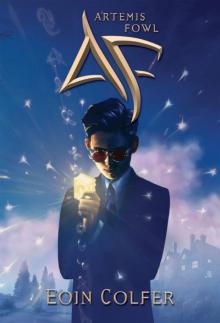 Artemis Fowl
Artemis Fowl Plugged
Plugged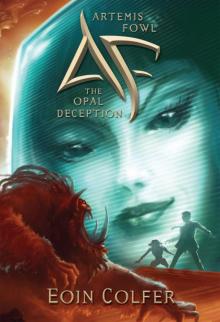 The Opal Deception
The Opal Deception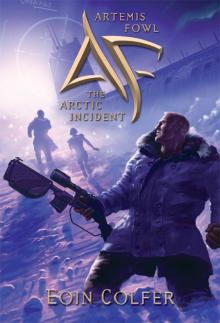 The Arctic Incident
The Arctic Incident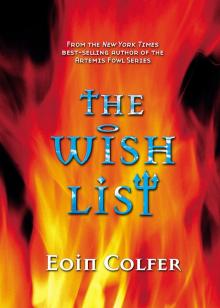 The Wish List
The Wish List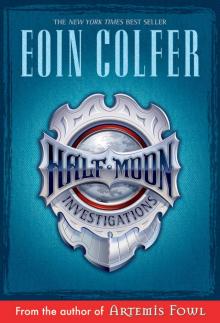 Novel - Half Moon Investigations
Novel - Half Moon Investigations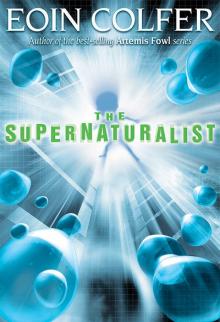 The Supernaturalist
The Supernaturalist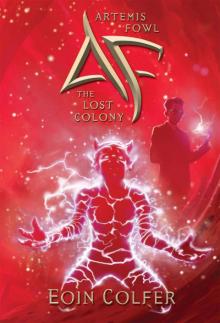 The Lost Colony
The Lost Colony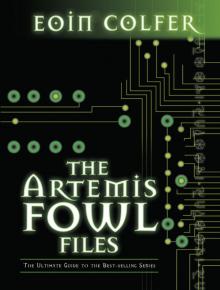 The Artemis Fowl Files
The Artemis Fowl Files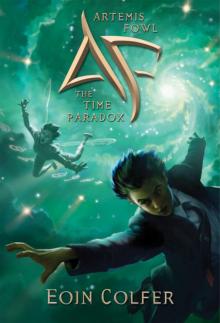 The Time Paradox
The Time Paradox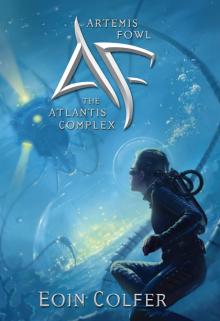 The Atlantis Complex
The Atlantis Complex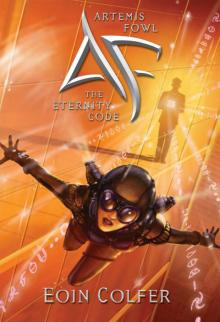 The Eternity Code
The Eternity Code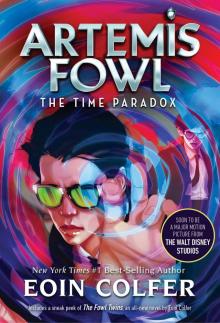 The Time Paradox (Disney)
The Time Paradox (Disney)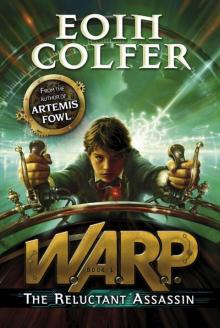 The Reluctant Assassin
The Reluctant Assassin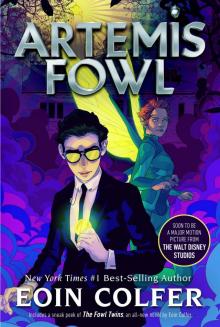 Artemis Fowl (Disney)
Artemis Fowl (Disney) Highfire
Highfire The Last Guardian
The Last Guardian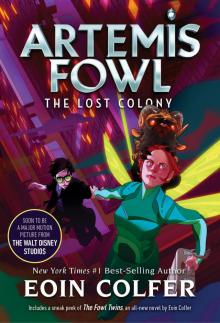 The Lost Colony (Disney)
The Lost Colony (Disney) Screwed: A Novel
Screwed: A Novel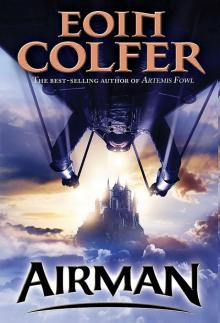 Novel - Airman
Novel - Airman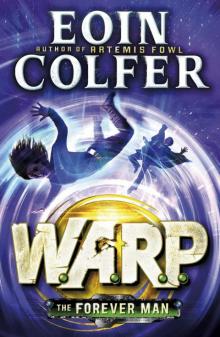 The Forever Man
The Forever Man And Another Thing...
And Another Thing...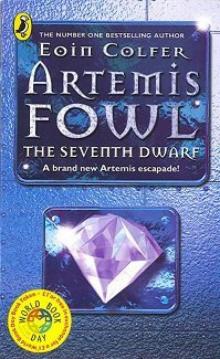 The Seventh Dwarf
The Seventh Dwarf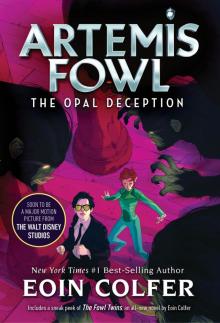 The Opal Deception (Disney)
The Opal Deception (Disney)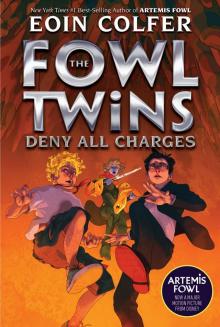 The Fowl Twins Deny All Charges
The Fowl Twins Deny All Charges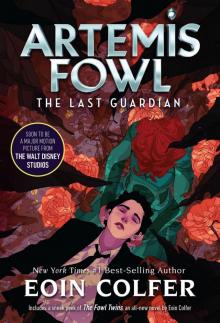 The Last Guardian (Disney)
The Last Guardian (Disney) The Hangman's Revolution
The Hangman's Revolution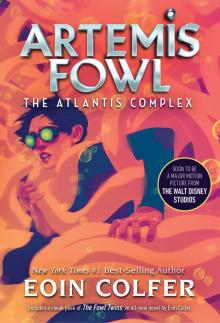 The Atlantis Complex (Disney)
The Atlantis Complex (Disney)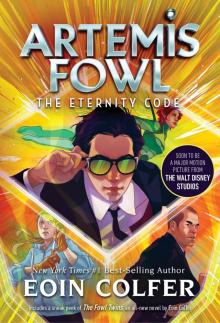 The Eternity Code (Disney)
The Eternity Code (Disney)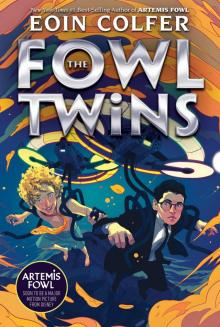 The Fowl Twins
The Fowl Twins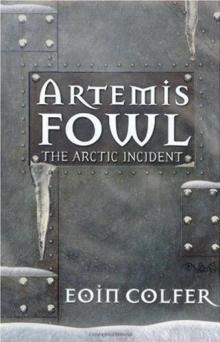 Artemis Fowl. The Arctic Incident af-2
Artemis Fowl. The Arctic Incident af-2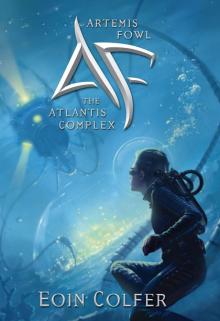 Artemis Fowl and the Atlantis Complex af-7
Artemis Fowl and the Atlantis Complex af-7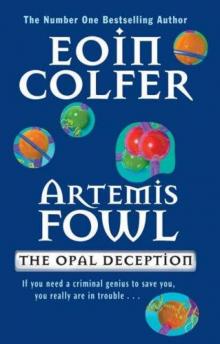 Artemis Fowl. The Opal Deception af-4
Artemis Fowl. The Opal Deception af-4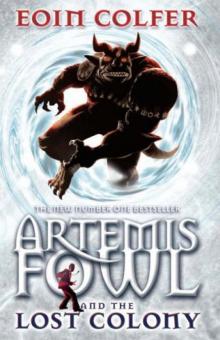 Artemis Fowl. The Lost Colony af-5
Artemis Fowl. The Lost Colony af-5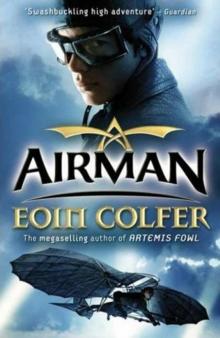 Airman
Airman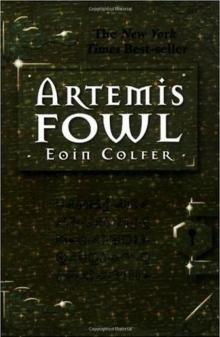 Artemis Fowl af-1
Artemis Fowl af-1 Artemis Fowl: The Eternity Code af-3
Artemis Fowl: The Eternity Code af-3 Screwed dm-2
Screwed dm-2